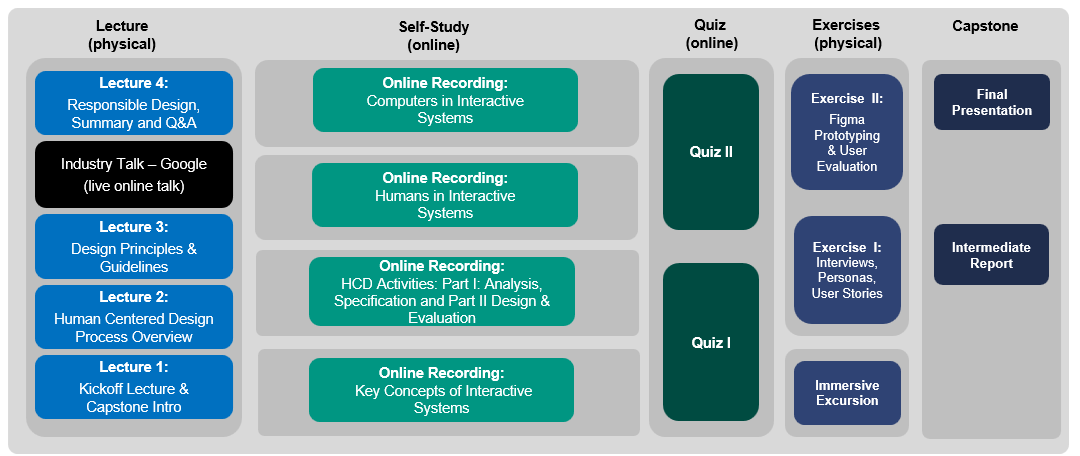Foundations of Interactive Systems
- Type: Lecture (V)
- Semester: SS 2024
-
Time:
Tue 2024-04-16
09:45 - 11:15, weekly
Seminarraum Hauptgebäude
10.11 Verwaltungsgebäude, Hauptbau (2. OG)
Tue 2024-04-23
09:45 - 11:15, weekly
Seminarraum Hauptgebäude
10.11 Verwaltungsgebäude, Hauptbau (2. OG)
Tue 2024-04-30
09:45 - 11:15, weekly
Seminarraum Hauptgebäude
10.11 Verwaltungsgebäude, Hauptbau (2. OG)
Tue 2024-05-07
09:45 - 11:15, weekly
Seminarraum Hauptgebäude
10.11 Verwaltungsgebäude, Hauptbau (2. OG)
Tue 2024-05-14
09:45 - 11:15, weekly
Seminarraum Hauptgebäude
10.11 Verwaltungsgebäude, Hauptbau (2. OG)
Tue 2024-05-28
09:45 - 11:15, weekly
Seminarraum Hauptgebäude
10.11 Verwaltungsgebäude, Hauptbau (2. OG)
Tue 2024-06-04
09:45 - 11:15, weekly
Seminarraum Hauptgebäude
10.11 Verwaltungsgebäude, Hauptbau (2. OG)
Tue 2024-06-11
09:45 - 11:15, weekly
Seminarraum Hauptgebäude
10.11 Verwaltungsgebäude, Hauptbau (2. OG)
Tue 2024-06-18
09:45 - 11:15, weekly
Seminarraum Hauptgebäude
10.11 Verwaltungsgebäude, Hauptbau (2. OG)
Tue 2024-06-25
09:45 - 11:15, weekly
Seminarraum Hauptgebäude
10.11 Verwaltungsgebäude, Hauptbau (2. OG)
Tue 2024-07-02
09:45 - 11:15, weekly
Seminarraum Hauptgebäude
10.11 Verwaltungsgebäude, Hauptbau (2. OG)
Tue 2024-07-09
09:45 - 11:15, weekly
Seminarraum Hauptgebäude
10.11 Verwaltungsgebäude, Hauptbau (2. OG)
Tue 2024-07-16
09:45 - 11:15, weekly
Seminarraum Hauptgebäude
10.11 Verwaltungsgebäude, Hauptbau (2. OG)
Tue 2024-07-23
09:45 - 11:15, weekly
Seminarraum Hauptgebäude
10.11 Verwaltungsgebäude, Hauptbau (2. OG)
-
Lecturer:
Prof. Dr. Alexander Mädche
Moritz Langner - SWS: 3
- Lv-No.: 2540560
- Information: Blended (On-Site/Online)
Lecture Content
Computers have evolved from batch processors to highly interactive systems. This offers new possibilities besides challenges for designing a successful interaction between humans and computers. Interactive systems are socio-technical systems in which users perform tasks by interacting with technology in a specific context to achieve specified goals and outcomes. This lecture introduces key concepts and principles of interactive systems from a human and computer perspective. From a human perspective, we discuss selected individual characteristics, cognitive processes, the interplay between cognition and activity, as well asmental models. From a computer perspective, we introduce established interaction technologies as well as contemporary multimodal technologies (e.g. augmented/mixed reality, eye-based interaction, etc.). We also introduce established principles and guidelines for designing user interfaces. Furthermore, we describe the human-centered design process for interactive systems and supporting techniques & tools (e.g. personas, prototyping, user testing).
With this lecture, students acquire foundational knowledge to successfully design the interaction between humans and computers in business and private life. The course is complemented with a Design Capstone Project, where students in a team apply design methods & techniques to create an interactive prototype. This year's Capstone Project will focus on applying the human-centered design process to create an app that supports the achievement of a Sustainable Development Goal (SDG), such as reducing food waste (SDG 2), increasing gender equality (SDG 5), or reducing carbon footprint (SDG 13).

Learning Objectives
The students
- have a basic understanding of key conceptual and theoretical foundations of interactive systems from a human and computer perspective
- are aware of important design principles for the design of important classes of interactive systems
- know design processes and techniques for developing interactive systems
- know how to apply the knowledge and skills gathered in the lecture for a real-world problem (as part of design capstone project)
Prerequisites: No specific prerequisites are required for the lecture
Language of instruction: English
In case of questions feel free to approach Moritz Langner (moritz.langner@kit.edu).

